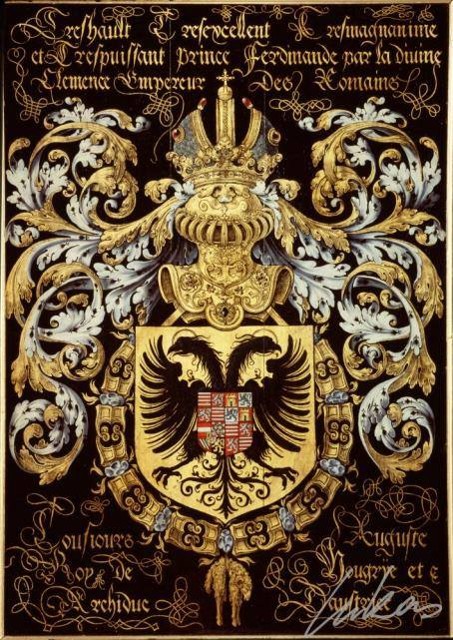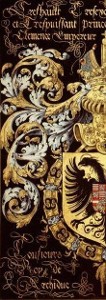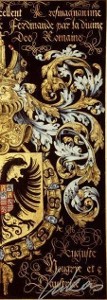
|
The Powers and Titles of the Holy Roman Emperor The powers of the Emperor were exercised in a broad range of areas, but restricted everywhere:
Jura reservata: The emperor had certain powers that flowed from his position as sovereign of the empire, from his plenitudo potestatis. Over time, this "plenitude of power" became restricted. By the 17th c., the powers of the emperor which were specifically his were called jura reservata or reserved rights; they were opposed to the powers of the Reichstag on one hand, the powers of the individual territories on the other. The reserved rights were divided into the unrestricted (jura reservata illimita) and restricted (jura reservata limita) depending on whether the Reichstag was involved or not. They were also divided into exclusive (jura reservata exclusiva) or concurrent (jura reservata communia), depending on whether the individual territories also enjoyed those rights or not.Examples of such imperial powers include:
The emperor delegated the exercise of these rights to officials called counts palatine (Hofpfalzgrafen). Such delegated powers were called comitiva, and distinguished into the comitiva minor (power to grant majority, legitimize, appoint notaries, grant arms) and comitiva major (ennoblement and power to delegate the comitiva minor). The comitiva minor was commonly bestowed to rulers of territories or titular counts, as well as attached to certain positions (such as provosts of universities). The comitiva major was rarely bestowed, and it was hereditary in the houses of Pfalz and Schwarzburg.
Titles and Styles Charles, king of the Franks, received the title of Emperor on Christmas Day 800 from Leo III in St. Peter's in Rome. According to his biographer Einhard (Vita Karoli Magni, par. 28) Charlemagne was taken by surprise and would never had entered the church that day had he known was the pope was up to. Nevertheless, he accepted the title. His official style in documents, as emperor, was: Imperator Augustus Romanum gubernans Imperium or serenissimus Augustus a Deo coronatus, magnus pacificus Imperator Romanorum gubernans Imperium. (All the Western original sources on Charlemagne's coronation are available). The title of Emperor was confirmed by Byzantium in 812. Otto I, in 962, assumed the style of imperator augustus. In 966 he also used the style imperator augustus Romanorum ac Francorum, but reverted the same year to the previous, simpler style, which his successors kept. By the 12th century, the standard style was Dei gratia Romanorum imperator semper augustus, and it remained until the 16th c. Throughout the Middle Ages, the convention was that the (elected) king of Germany (a kingdom formed by the division of the empire in 843 and the separation of the western Franconian kingdom in 888) was also Emperor of the Romans. His title was royal (king of the Germans, or from 1237 king of the Romans) from his election to his coronation in Rome by the pope; thereafter, he was emperor. After the death of Frederic II in 1250, however, formal coronation by the pope happened less frequently: Henry VII in 1312, Charles IV in 1355, Sigismund in 1433, Frederick III in 1452, Charles V in 1530. The title of "king of the Romans" became less and less reserved for the emperor-elect but uncrowned in Rome; the emperor-elect was either known as German king or simply styled himself "imperator" (see the example of Ludwig IV below). The reign was dated to begin either from the day of election (Philipp, Rudolf of Habsburg) or the day of the coronation (Otto IV, Heinrich VII, Ludwig IV, Karl IV). The election day became the starting date permanently with Siegmund.
Ultimately, Maximilian I changed the style of the emperor in 1508, with papal approval: after his German coronation, his style was Dei gratia Romanorum imperator electus semper augustus. That is, he was "emperor elect": a term that did not imply that he was emperor-in-waiting or not yet fully emperor, but only that he was emperor by virtue of the election rather than papal coronation (by tradition, the style of rex Romanorum electus was retained between the election and the German coronation). At the same time, the custom of having the heir-apparent elected as king of the Romans in the emperor's lifetime resumed. For this reason, the title king of the Romans (Rex Romanorum, sometimes king of the Germans or Rex Teutonicorum) came to mean heir-apparent, the successor elected while the emperor was still alive. The German translation of the imperial style was Von Gottes Gnaden (erwählter) Römischer Kaiser, zur aller Zeit Mehrer des Reichs. The peculiar "translation" of semper augustus appears on a Lehenbrief (letter of enfeoffment) of 1301 in the form zu allen ziden ein merer des heiligen Romischen riches. The emperor had precedence over all Christian monarchs. The emperor's wife, the Empress, also had rank, but not his children, since the office was elective.
|








